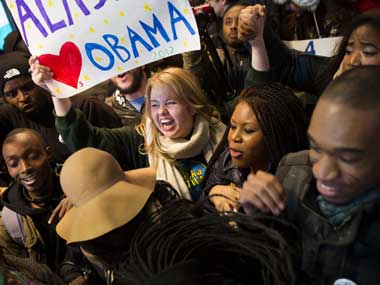Memories don’t leave like people do. And as US President Barack Obama steps up to rejoice in the success of his re-election, he can be thankful for the persistence of memory. And in particular, that a sufficiently large number of US voters still remember George W Bush, the previous President, even four years after he left office. Nothing else can account for how an incumbent President, presiding over an enfeebled economy, with unemployment running at over 7 percent for four straight years, could possibly secure re-election against a man running on his record as a successful businessmen who could create jobs. As voters went to the polling stations on Tuesday, exit poll surveys confirmed that the state of the economy was uppermost on their minds. That ought to have been bad news for Obama, given that he has not had much signal success in fixing the economy in the four years since he inherited the mess from Bush following the financial meltdown of 2008. Although the US economy has averted a repeat of the very real risk of another Great Depression, and has recovered marginally during Obama’s four years in office, it is still on life support. For millions of Americans, it doesn’t feel like their country is on the mend. And, as the Republican party keeps reminding them, even the weak recovery has come at the cost of ramping up debt to unsustainable levels. [caption id=“attachment_517711” align=“alignleft” width=“380”]  Obama has been fairly successful in winding down the US military machine overseas , one of the legacies of the Bush era. AP[/caption] But, strikingly, the same exit polls from Tuesday also confirmed that although many voters felt that the US economy had a long way to go towards recovery, they were “less likely to blame President Barack Obama for the economic troubles… than to point the finger at his predecessor, George W. Bush.” Even though Obama secured far fewer popular votes and electoral college votes than during his election in 2008, his re-election today, and the sentiment underlying the exit poll surveys, reflects a rara sagacity among US voters that allowed them to frame the weak economy in the right context — in a way that seldom happens in the heat and dust of a combative election cycle. After all, it was the go-go years of the George W Bush years, during which the rich got tax breaks, and the poor and middle class got shafted, that led up to the colossal crash-bang of the US economy in 2008. And particularly after the 9/11 terror attacks on the US, Bush blundered recklessly into war in Afghanistan and Iraq and ran up sky-high deficits. All during his term in office, Bush also advanced the callous deregulation of the financial services industry (that has been going on ever since the Ronald Reagan presidency, and continued even under Democractic Presidencies), which contributed to the collapse of the financial markets in 2008. Obama has been fairly successful in winding down the US military machine overseas , one of the legacies of the Bush era. But his efforts to roll back the fiscal excesses of the Bush era have been stymied at every stage by the Republican party, particularly after the latter took control of the House of Representatives in 2010 on the strength of the far-right fringe Tea Party movement. It is another matter that for all his rhetoric, and the colourful fat-cat names he called them, Obama has not exerted himself fully in the cause of taming Wall Street excess. Mitt Romney’s economic philosophy was, in large part, centred around returning to the same Bush era template: of lowering taxes on the rich, and cutting back on social welfare entitlements for the poor and the middle class. During one telling moment during the Republican primaries, Romney was asked if he would agree to 1 dollar in tax raises on the rich in return for 10 dollars in entitlement cuts. In his eagerness to pander to the extreme right wing, as happens during every primary race, Romney, to his eternal shame, said he would not. Obama’s campaign theme therefore revolved around the folly of returning to the old Bush-era ways of running the country, and the unwisdom of not making long-term investments in enhancing the skills and capabilities of the middle class. It may not have been the most persuasive defence of his own record in office, but it was a valid case nonetheless. It is a measure of the maturity of US voters that in large part, and despite the close nature of the race, sufficient numbers of them were persuaded by the merit of the Obama campaign’s argument — and voted to exorcise the spectre of George W Bush. Given the arithmetic of the new Congress, and given that Obama returns to power a somewhat diminished President, there is still a political battle ahead, particularly as they grapple to make the cutbacks necessary to lighten America’s debt burden. But merely by voting against a return to the Bush era policies, US voters have sent a powerful message about their past and their future.
By voting against a return to the flawed economic policies of the Bush era, US voters have sent a powerful message about their past and their future.
Venky Vembu attained his first Fifteen Minutes of Fame in 1984, on the threshold of his career, when paparazzi pictures of him with Maneka Gandhi were splashed in the world media under the mischievous tag ‘International Affairs’. But that’s a story he’s saving up for his memoirs… Over 25 years, Venky worked in The Indian Express, Frontline newsmagazine, Outlook Money and DNA, before joining FirstPost ahead of its launch. Additionally, he has been published, at various times, in, among other publications, The Times of India, Hindustan Times, Outlook, and Outlook Traveller. see more


)

)
)
)
)
)
)
)
)



